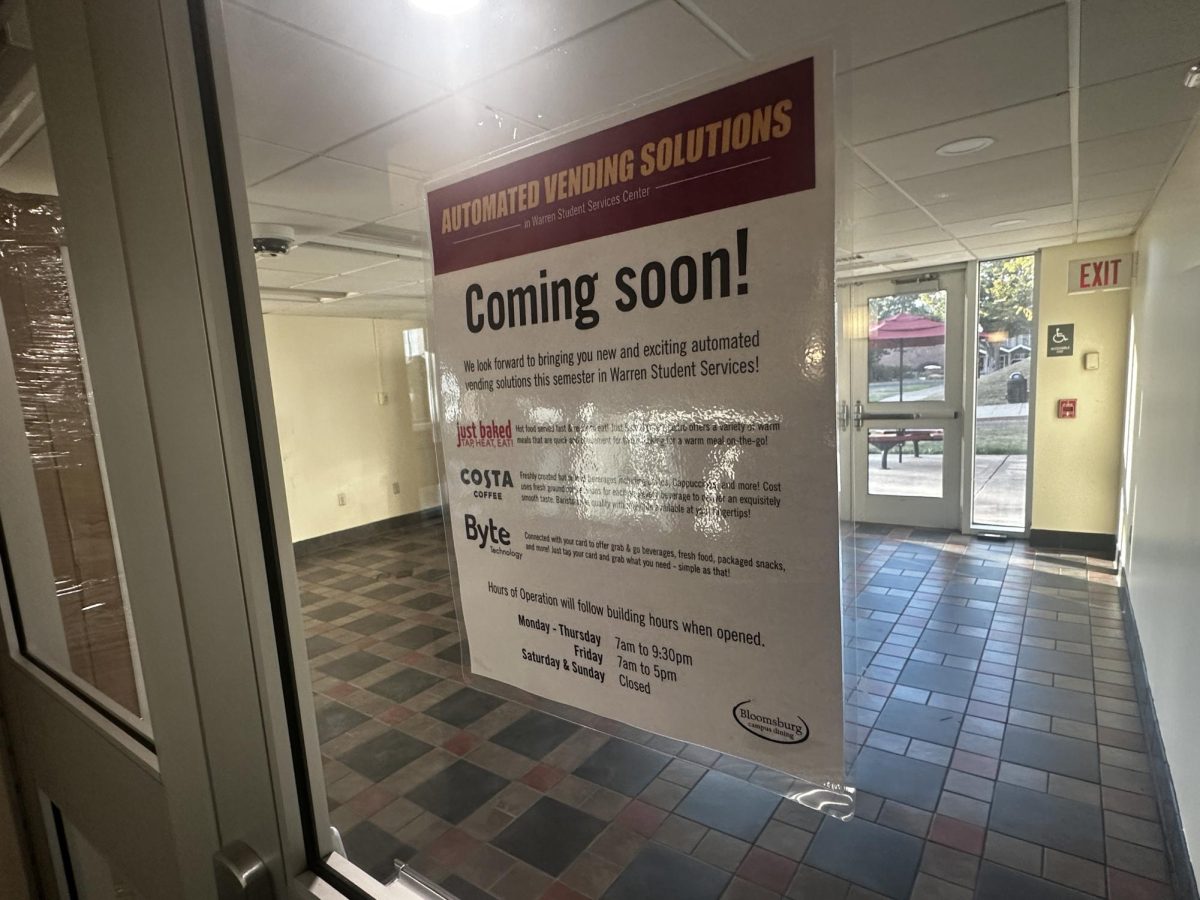Zipping along 5th Street in her light green Ford, she struggled to see the road in front of her. Though the conditions were poor, she knew she had to make her way through town.
Suddenly, an unsuspecting driver rammed into her vehicle while pulling out of a driveway; the snow was so dense, the other driver could barely even see her.
For Emily Wolfe, the struggle to make it to campus is nothing new. She is but one of many commuter students at Bloomsburg who toil in the face of adversity to receive an education like her peers.
According to an estimate from the University Assessment Office, approximately 15 percent of Bloomsburg’s student population is comprised of commuter students.
Wolfe, a junior Medical Laboratory Science major, originally chose to commute to BU from home due to their strong program for her intended major. However, she says the welcome she received was disappointing.
“Everything at my orientation was totally focused towards residents, so for me it felt like a waste of time,” she says. “There was one twenty minute program [for commuters]. That was it… there [didn’t] seem to be any commuter recognition”
Tim Kirk, a sophomore Music Education major, says he shared a similar experience. “The ‘commuter social’ at our orientation was pathetic,” he says, explaining that “they put all [the new commuters] into one room” after promising them there would be food, and allegedly only provided “one cheese plate for what seemed like one hundred students.”
Anna Jaskiewicz, a junior English Literature major, also feels that commuter students are neglected when it comes to their college orientation suggesting that BU could possibly provide an orientation “solely” catered to the commuting experience.
As Kirk and Wolfe explain, the lack of information driven towards commuter students makes them feel unwelcome on campus: “they put so much more effort into students who live on campus…we feel forgotten,” says Kirk.
Assistant Dean of Students Monica Johnson, however, says that Bloomsburg does take steps in order to help commuters feel more welcome on campus.
“When I started here, I actually created a commuter page on [BU’s] website to list all of the different resources that they can use on campus,” she explains. Additionally, she says, the university’s newly formed orientation committee is looking into improving the orientation experience for all students.
Past their initial orientation, commuter students say they continue to face difficulties both at school and at home.
“A lot of people think commuters are odd and anti-social because we opted to commute rather than live on campus,” says Jaskiewicz. “I had to join multiple clubs on campus to prove to others, and myself, that I’d be able to make friends and build lasting relationships.” Another overlooked aspect, according to Jaskiewicz, is the “added pressure” of commuters remaining a part of their family’s routine. In addition to their busy schedules, she says, “commuters also have ‘home responsibilities’ that other college students get to escape during the semesters…since I don’t physically leave for school, family members don’t seem to understand that I am essentially just as busy.”
While BU’s commuters save money by living at home as opposed to in a residence hall or apartment, they face extra difficulties as a result of choosing to commute.Wolfe explains that while she understands the university has to profit off on food, “buying food on campus is so expensive if you don’t have a meal plan.” Many commuters, as she explains, are on campus for long hours each day and may not have the ability to pack enough food, forcing them to make tough decisions when it comes to campus dining.
“Commons itself is so expensive; it’s virtually twice the cost without a meal plan” agrees Kirk.Johnson offers a possible solution to this problem, advising students to look into the university’s smaller “package plans.”“I completely understand not wanting to purchase a full meal plan if you’re not always going to be on campus,” she says, “so our smaller plans where you can buy a set number of meals could be a good option.”Another challenge facing commuters, as Jaskiewicz explains, is the commute to campus itself.“The parking situation is a disaster…there aren’t enough parking spots for every commuter, and I think it’s ridiculous that they can’t find room for more parking spaces somewhere on campus” she says. “In years past,” she continues, “BU has also failed to keep commuters in mind when deciding if campus should be closed due to inclement weather.” Johnson also sympathizes with students struggling with the commute to campus.
“Faculty members also have to drive here every day, so I understand how that can be frustrating.” “Unfortunately,” Johnson says, “there’s not much more [BU] can do [in this area].” Another point of contention between commuter students and the university is located within the Student Services Center. Located on the bottom floor of the SSC is a room designated as a “Commuter Lounge.” The room, however, is not labeled, making it unclear for students searching for the room. The only place in the lounge clearly marked with “commuter lounge,” in fact, is a container holding an assortment of silverware in one of the corners of the room. “No one even knows about the commuter lounge,” says Wolfe, and Kirk agrees noting he “never heard anything about it, and didn’t even know it existed.”
Johnson says that she was unaware of the specific complaints surrounding the commuter lounge, but she is open to help make improvements: “I think that a sign there to make [the lounge] more clear to students is a great idea” she says. While there still remains great tension between commuters and the very campus they attend, many remain hopeful that commuters can someday have their struggles recognized.Johnson states that she is always open to hearing student’s concerns regarding their experiences at Bloomsburg. “If a student brings a concern to me, I will not ignore it; I will keep track of them all and take them to the appropriate offices on campus.” “For starters,” says Kirk, “they need to put more effort into making us feel welcome… there’s a lot of us, and we struggle every day. Jaskiewicz also believes that Bloomsburg could try to implement ways to help commuters feel welcome, “besides [just] fixing the parking situation.” Wolfe agrees, summing her thoughts into one statement: “figure something out, Bloomsburg. You’ve got students who need help.”






















